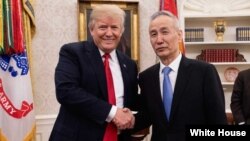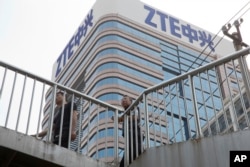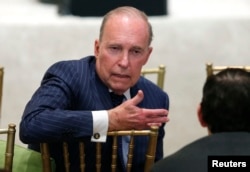President Donald Trump stepped into a round of tough trade talks with China on Thursday after the White House confirmed a meeting between the U.S. president and Chinese Vice Premier Liu He.
The two world powers are taking part in a second series of trade negotiations that started Thursday. The initial talks were held in Beijing two weeks ago.
Speaking to reporters before his meeting with Liu, Trump repeated his strong dislike for previous deals between Washington and Beijing.
"The United States has been ripped off for many, many years by its bad trade deals. I don't blame China; I blame the leadership of this country from the past," Trump told reporters before a meeting with NATO Secretary-General Jens Stoltenberg.
"China has taken out hundreds of billions of dollars a year from the United States, and I explained to President Xi [Jinping] we can't do that anymore," Trump added.
The talks are aimed at "rebalancing the United States-China bilateral economic relationship," according to the White House. They are also aimed at avoiding a full-blown trade war after the two countries exchanged tariff threats in March.
Despite the tough talks, Trump tweeted over the weekend that he was working with Xi to give Chinese phone company ZTE a way to get back into business.
The U.S. slapped sanctions against the Chinese telecommunications company last month for breaking U.S. trade control laws by selling components to Iran and North Korea. The move prompted ZTE to shut down its U.S. operations.
U.S. law enforcement and intelligence communities have long had national security and espionage concerns about ZTE.
"ZTE was a company I spoke to with President Xi. He asked me if I could take a look at that, because it was very harmful to them in terms of their jobs and probably other things, and I certainly said I would — he asked me to do it, and I would do that. I like him, he likes me, we have a great relationship," Trump said in explaining his tweet to reporters.
Trump noted it was his administration that had first put strong clamps on ZTE.
"Anything we do with ZTE is just a small component of the overall deal. I can only tell you this: We are going to come out fine with China," Trump said. "When you're losing $500 billion a year on trade, you can't lose the trade war, you've already lost it."
Liu, who is Xi's top economic adviser, is taking part in two days of talks with a U.S. trade delegation led by Treasury Secretary Steve Mnuchin.
Trump's top economic adviser, Larry Kudlow, told reporters Wednesday that the administration was conducting "very serious" talks with China, and that Trump was "very hands-on" and "involved in every decision."
"We have requested that China change their trading practices, which are unfair and in many ways illegal," Kudlow said.
"This is with respect to the issue of theft of technology, forced transfers of technology, high tariffs and non-tariff barriers" that are preventing the United States from making a competitive effort to export goods and services to China, he said.
The economic adviser said the administration had given China a "lengthy, detailed list" of what the U.S. wanted, including narrowing the U.S.-China trade deficit, lowering non-tariff barriers and permitting American ownership of its own companies in China.
"Right now, the limit is 49 percent and that's one of the causes of the theft and transfer of viable technology," Kudlow said. "When we do these joint ventures, we should have to own 51 percent on to 100 percent. That's a key part of these talks."






